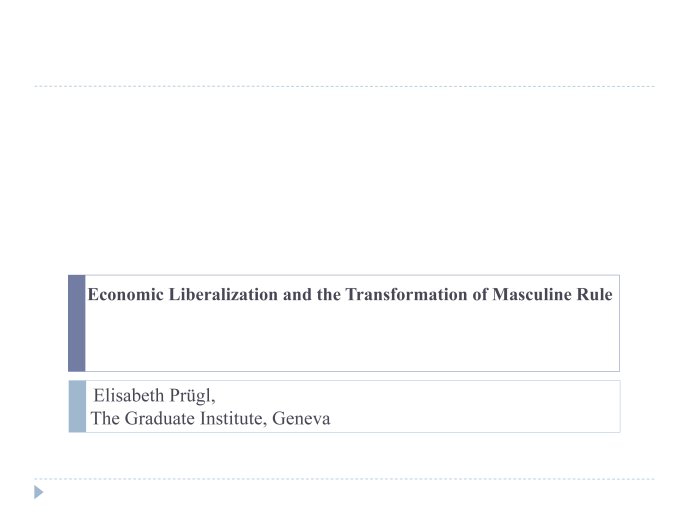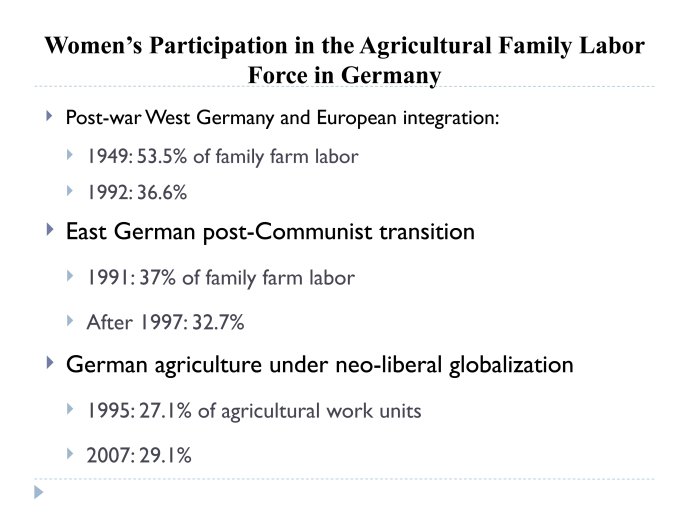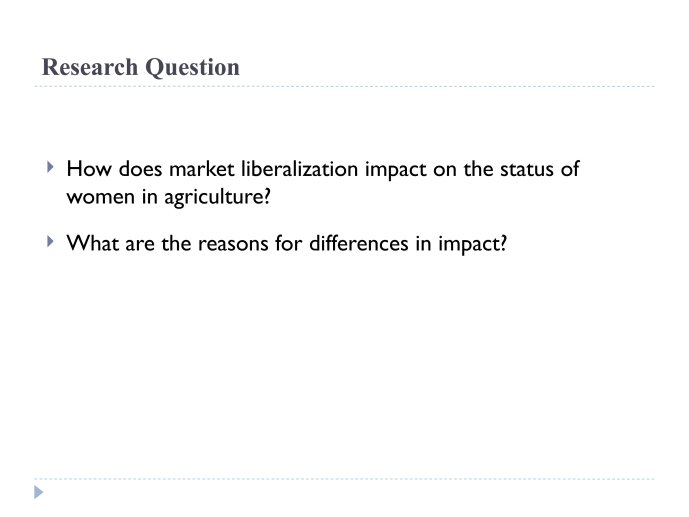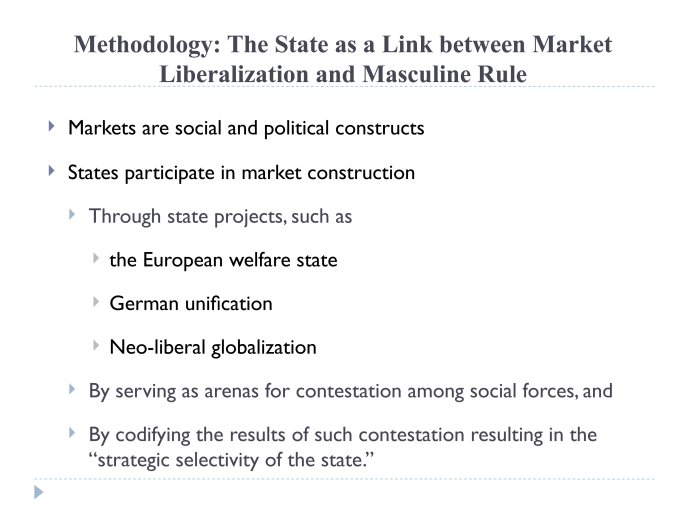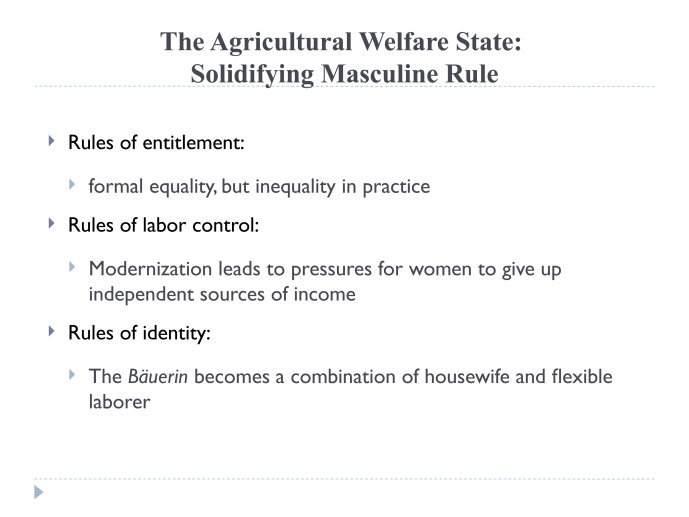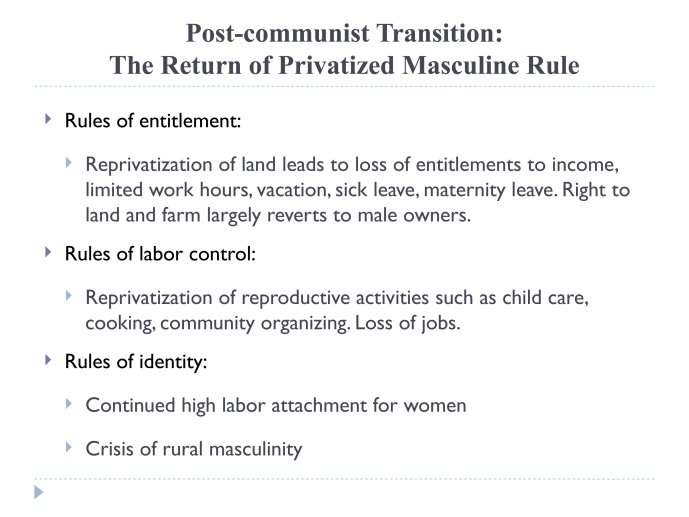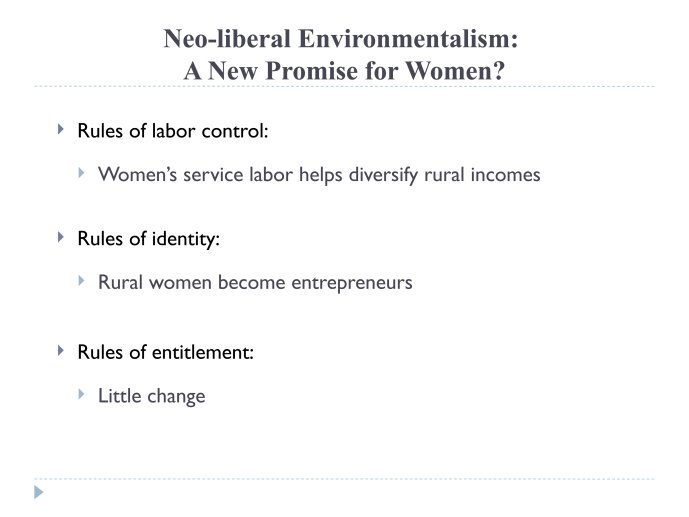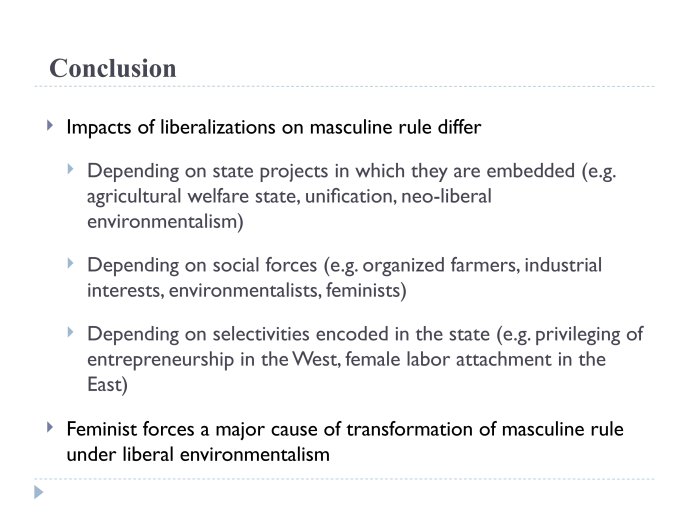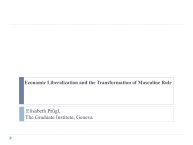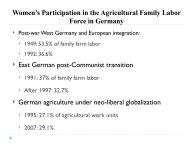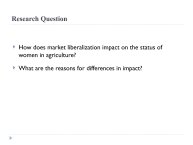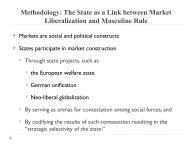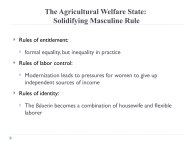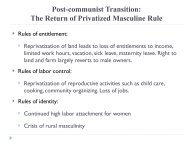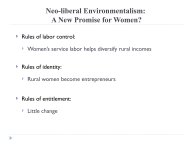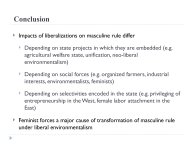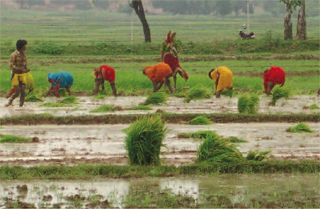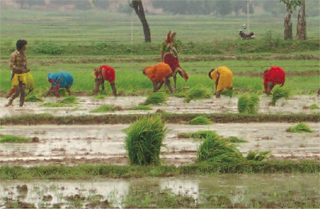Notice
Economic Liberalization and the Transformation of Masculine Rule in German Agriculture / Elisabeth Brügl
- document 1 document 2 document 3
- niveau 1 niveau 2 niveau 3
Descriptif
Economic Liberalization and the Transformation of Masculine Rule in German Agriculture / Elisabeth Brügl. In colloque « Genre et agriculture familiale paysanne. Regards Nord-Sud. Débats entre mondes académique, du développement et de la formation », organisé par le Laboratoire Dynamiques Rurales (Université Toulouse II), l’École Nationale de Formation Agronomique (ENFA) de Toulouse-Auzeville, le laboratoire Environnement, Ville, Société de l'Université de Lyon 3 et l'Association Genre en Action. Université Toulouse II-Le Mirail, 22-24 mai 2012.
After the end of the Second World War, German farming was a feminine activity as women accounted for 53 to 54 percent of the total agricultural labor force. By the beginning of the 1990s this proportion had shrunk to less than 37 percent, in other words a reduction of more than 30 percent. While women were the majority of the agricultural labor force throughout the 1950s, they made up only a little more than a third by the 1990s.
In the German Democratic Republic, women accounted for about 40 percent of those employed in agriculture. Immediately in the aftermath of German unification in 1991, only 25 percent of women employed in agriculture during GDR times still had jobs. Or, to put Elisabeth Prügl, [Gender Orders in German Agriculture : From the Patriarchal Welfare State to Liberal Environmentalism. Sociologia Ruralis 4, vol. 44, 2004] this differently, 75 percent lost their jobs. (This compares to about 65 percent of men.) Today women make up only about a third of the agricultural workforce in the former East.
Between 1995 and 2007 the proportion of female family labor contributed to agricultural work in Germany has increased by two percent, with increases particularly pronounced on very big and very small farms.
Thème
Documentation
Bibliographie sélective
Elisabeth Prügl, Transforming Masculine Rule: Agriculture and Rural Development in the European Union, University of Michigan Press, 2011, 181 p.
Elisabeth Prügl, Feminism and the Postmodern State: Gender Mainstreaming in European Rural Development, Signs: Journal of Women in Culture and Society 2 vol. 32, Winter 2010, pp. 447-475.
Elisabeth Prügl, Does Gender Mainstreaming Work? Feminist Engagements with the German Agricultural State, International Feminist Journal of Politics 2, vol. 11, May 2009, pp. 174-195.
Elisabeth Prügl, Gender Orders in German Agriculture : From the Patriarchal Welfare State to Liberal Environmentalism, Sociologia Ruralis 4, vol. 44, October 2004, pp. 349–372.
> Voir aussi la bibliographie générale de colloque dans l'onglet "Documents" de la séquence vidéo d'ouverture du colloque.
Dans la même collection
-
Teikei ou AMAP : initiatives féminines autour des expériences de circuits courts, comparaison Franc…
Humbert-AmemiyaHirokoTeikei ou AMAP : initiatives féminines autour des expériences de circuits courts, comparaison France-Japon / Hiroko Amemiya. In colloque « Genre et agriculture familiale paysanne. Regards Nord-Sud.
-
Genre et agriculture familiale paysanne. Regards Nord-Sud. Ouverture du colloque
Genre et agriculture familiale et paysanne. Regards Nord-Sud. Débats entre mondes académique, du développement et de la formation : ouverture. Colloque « Genre et agriculture familiale paysanne.
-
Genre et agriculture familiale paysanne. Regards Nord-Sud. Présentation du colloque / Hélène Guetat…
Guétat-BernardHélèneRamarokoto RaoelimiadanaJeannineGenre et agriculture familiale paysanne. Regards Nord-Sud. Débats entre mondes académique, du développement et de la formation. Présentation / Hélène Guetat, Jeannine Ramarokoto Raoelimiadana.
-
L'impact des inégalités de genre sur la sécurité alimentaire : quelles politiques ?
VillarrealMarcelapar Marcela Villarreal
-
Le changement social par l'intégration du genre dans les projets économiques liés aux activités agr…
SemblatMarie-LiseSuremainMarie-Dominique deLe changement social par l'intégration du genre dans les projets économiques liés aux activités agricoles et agro-alimentaires en Afrique de l'Ouest / Marie-Lise Semblat, Marie-Dominique de Suremain.
-
10 ans d'actions pédagogiques sur le thème de l'égalité des chances filles-garçons dans l'enseignem…
GiraudelAnne10 ans d'actions pédagogiques sur le thème de l'égalité des chances filles-garçons dans l'enseignement technique agricole / Anne Giraudel
-
Engagement féminin et agriculture vivrière familiale / Oumar Ismaila Diallo
DialloOumar IsmailaEngagement féminin et agriculture vivrière familiale / Oumar Ismaila Diallo. In colloque « Genre et agriculture familiale paysanne. Regards Nord-Sud. Débats entre mondes académique, du
-
Rapports de genre et écologie : quel dialogue possible ? / Jean-Louis Hemptinne
HemptinneJean-LouisRapports de genre et écologie : quel dialogue possible ? / Jean-Louis Hemptinne.
-
Mujeres campesinas en la Cuenca del rio Pixquiac, Mexico. Reflexiones desde lo local para nuevos es…
AlmeidaElsaMujeres campesinas en la Cuenca del rio Pixquiac, Mexico. Reflexiones desde lo local para nuevos esquemas de participacion social entre hombres y mujeres / Elsa Almeida
-
Changements agro-écologiques, production sociale et identité paysanne au Burkina Faso / Gabin Korbé…
KorbéogoGabinChangements agro-écologiques, production sociale et identité paysanne au Burkina Faso / Gabin Korbéogo.
-
Mesurer l'immesurable, devoir rendre des comptes, rendre visible pour mieux combattre : les indicat…
HofmannÉlisabethMesurer l'immesurable, devoir rendre des comptes, rendre visible pour mieux combattre : les indicateurs de genre entre enjeux opérationnels et politiques / Elisabeth Hofmann
-
Les politiques européennes d'égalité de genre dans le développement rural / Nelly Bandarra Jazra
Bandarra JazraNellyLes politiques européennes d'égalité de genre dans le développement rural / Nelly Bandarra Jazra
Sur le même thème
-
Genre et agriculture familiale paysanne. Regards Nord-Sud. Présentation du colloque / Hélène Guetat…
Guétat-BernardHélèneRamarokoto RaoelimiadanaJeannineGenre et agriculture familiale paysanne. Regards Nord-Sud. Débats entre mondes académique, du développement et de la formation. Présentation / Hélène Guetat, Jeannine Ramarokoto Raoelimiadana.
-
Le changement social par l'intégration du genre dans les projets économiques liés aux activités agr…
SemblatMarie-LiseSuremainMarie-Dominique deLe changement social par l'intégration du genre dans les projets économiques liés aux activités agricoles et agro-alimentaires en Afrique de l'Ouest / Marie-Lise Semblat, Marie-Dominique de Suremain.
-
Engagement féminin et agriculture vivrière familiale / Oumar Ismaila Diallo
DialloOumar IsmailaEngagement féminin et agriculture vivrière familiale / Oumar Ismaila Diallo. In colloque « Genre et agriculture familiale paysanne. Regards Nord-Sud. Débats entre mondes académique, du
-
Organisation familiale et forme sociale de production en agriculture (thème 1) : synthèse des ateli…
Organisation familiale et forme sociale de production en agriculture (thème 1) : synthèse des ateliers

